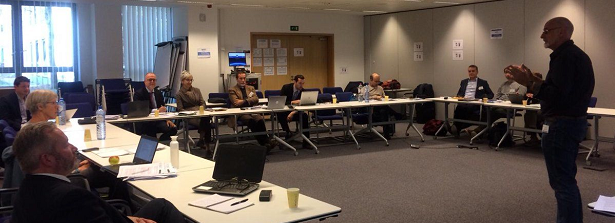Launch EU Policy brief “Programming Research and Innovation for Improved Impact”

Multi-actor research with ex-ante assessment, which is beginning to be applied in EU programmes, can foster development impact when conducted within a right enabling environment. This was concluded by the SCAR Strategic European Working Groups ARCH, AKIS & SCAR Food Systems on October 31, 2018 at a joint launch of the Policy Brief in Brussels. The Policy Brief “Programming Research and Innovation for improved impact” was written based on discussions and conclusions from a jointly held workshop in Rome on April 6, 2018 and was presented to the meeting participants. The Policy Brief was launched with the main aim to identify a way forward which will allow better use of the Brief by the EC and also Member States in terms of research agendas and policy issues.
Presentation of the Policy Brief
On behalf of the writing group Kevin Heanue (Teagasc) presented the main messages of the Brief. A real cultural shift for all actors involved is needed to consider impact before research projects are initiated. For this, understanding the impact pathways is key. Policy makers and funders have considerable influence in shaping the enabling environment. However, impact assessment can be hindered by market and policy distortions, barriers to diffusion of new technology, and difficulties for researchers to clearly define the research topic together with the beneficiaries. To embed research in broader economic, political, social and cultural contexts, a multi-actor and interdisciplinary approach and dialogue is required. All relevant actors need to monitor and evaluate and focus on potential impact. This means moving away from a linear view of change towards systemic understanding. The intensity of this participatory approach depends on the extent of applied research. Challenges are incentives for researchers and possible skills deficits even as the decision whom to work with. Knowledge support, innovation and knowledge brokering services can play a role here. Policy makers should also co-design and co-deliver and more flexible funding regulations are desired.
The report concluded with 12 recommendations (see p 4-5). Firstly, research institutions should develop a culture of impact at institutional level, widen collaboration and communication and include use of and achievement of impact indicators. Funding agencies will have to require a consideration of impact both ex ante and ex post including examples from which to learn. Policy makers should foster an enabling environment and ensure that funding regulations are flexible enough. SCAR Working Groups can provide advice on ex ante evaluation planning and monitoring. And lastly, all actors have to ensure a co-design and co-delivery approach to research and innovation, strengthen the environment for supporting impact generation and train researchers in multi-actor and co-creative working methods. Please, find the full presentation here.
Discussion
DG Research (RTD) responded indicating that the working groups have composed a good document at timely moment. Many aspects are beginning to be implemented in running Horizon projects, yet there is work to do for further implementation, e.g. defining broader reporting indicators at not only project but also programme and SDG level. Another aspect raised from the participants was how to implement ideas of the brief to not only research, but also innovation processes. It would also be good to get better insight in how other actors see researchers and the working with them in multi-actor partnerships. Input of all throughout the research process was said to be crucial including in a problem identification phase. The cultural shift from linear to food systems thinking instead of technical solutions and the needed flexibility (in time, goals and budget) and multi-stakeholder approach was stressed. DG RTD sees it as its role to show what involvement of farmers, business etc. means. Facilitating impact is a shared responsibility of researches and other actors. It demands specific skills which need to be trained. Facilitators and institutions, such as independent knowledge platforms in between the actors make processes easier and more effective. Also training scientists and other actors on working in multi-actor approach is important. For engagement, beside governments, all actors should financially contribute. Evaluation is important and should be less focused on precisely described outputs and also be done 5 years after the end of projects. Additionally less scientific activities that have more impact should get positive assessment. Finally a change of thinking is needed to enhance uncertainties of pathways.
Way forward
In terms of impact the EU Research policy is on the right track, but the required change needs to be accelerated. Working on good (open) data to measure implications of trade and policy could contribute to better cooperation. For systemic understanding a food systems approach is valuable. SCAR Working Groups should continue spreading the message on experiences gained and learned from.





